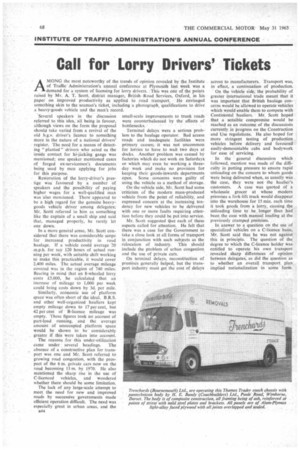Call for Lorry Drivers' Tickets
Page 70

If you've noticed an error in this article please click here to report it so we can fix it.
AMONG the most noteworthy of the trends of opinion revealed by the Institute of Traffic Administration's annual conference at Plymouth last week was a demand for a system of licensing for lorry drivers. This was one of the points raised by Mr. A. T. Scott, district manager, British Road Services, Oxford, in his paper on improved productivity as applied to road transport. Be envisaged something akin to the seaman's ticket, including a photograph, qualifications to drive a heavy-goods vehicle and the man' t record.
Several speakers in the discussion referred to this idea, all being in favour, although views on the form the proposal should take varied from a revival of the old h.g.v. driver's licence to something more in the nature of a national drivers' register. The need for a means of detecting " planted " drivers who acted as the inside contact for hi-jacking gangs was mentioned; one speaker mentioned cases of forged ex-servicemen's documents being used by men applying for jobs for this purpose.
Restoration of the lorry-driver's prestige was favoured by a number of speakers and the possibility of paying higher wages for a well-qualified man was also mentioned. There appeared to be a high regard for the genuine heavygoods vehicle driver among delegates; Mr. Scott referred to him as something like the captain of a small ship and said that, managed properly, he rarely let one down.
In a more general sense, Mr. Scott considered that there was considerable scope for increased productivity in road haulage. If a vehicle could average 20 m.p.h. for say 120 hours of actual running per week, with suitable shift working to make this practicable, it would cover 2,400 miles. The actual average mileage covered was in the region of 740 miles. Bearing in mind that an 8-wheeled lorry costs £5,000, he calculated that an increase of mileage to 1,000 per week could bring costs down by 3d, per mile.
Similarly, economic use of platform space was often short of the ideal. B.R.S. and other well-organized hauliers kept empty mileage down to 17 per cent, but 42 per cent of B-licence mileage was empty. These figures took no account of part-load running, and the average amount Of unoccupied platform space would be shown to be considerably greater if this were taken into account.
The reasons .for this under-utilization came under several headings. The absence of a constructive plan for transport was one and Mr. Scott .referred to growing road congestion, with the prospect of the b m. private can now on the road becoming 13 m. by 1970. He also mentioned the sharp rise in the use of C-liceneed vehicles, and wondered whether there should be some limitation.
The lack of any large-scale attempt to meet the need for new and improved roads by successive governments made efficient operation difficult. The need was especially great in urban areas, and the B44 small-scale improvements to trunk roads were counterbalanced by the effects of bottlenecks.
Terminal delays were a serious problem to the haulage operator. Bad access roads and inadequate facilities were primary causes; it was not uncommon for lorries to have to wait two days at docks. Another problem was caused by factories which do not work on Saturdays or which may even be working a threeday week and make no provision for keeping their goods-inwards departments open. Some concerns were guilty of using the vehicle as a method of storage.
On the vehicle side, Mr. Scott had some "criticism of the modern mass-produced vehicle from the point of reliability, and expressed concern at the increasing tendency for new vehicles to be delivered with one or more faults requiring attention before they could be put into service.
Mr. Scott suggested that each of these aspects called for attention. He felt that there was a case for the Government to take a close look at all forms of transport in conjunction with such subjects as the relocation of industry. This should include the problem of urban congestion. and the use of private cars.
On terminal delays, reconstruction of premises generally helped, but the transport industry must get the cost of delays across to manufacturers. Transport was, in effect, a contintiation of production.
On the vehicle side, the probability of greater international trade meant that it was important that British haulage concerns would be allciWed to operate vehicles which would enable them to compete with Continental hauliers. Mr. Scott hoped that a sensible compromise would be reached as an outcome of the discussions currently in progress on the Construction and Use regulations. He also hoped for more stringent testing of production . vehicles before delivery and favoured-. easily-demountable cabs and bodywork for ease of servicing.
In the general discussion which followed, mention was made of the difficulty in putting pressure to ensure rapid unloading on the concern to whom goods were being delivered when, as usually was the case, they were not the haulier's customers. A case was quoted of a wholesale grocer at whose modern premises a fork-lift truck would disappear into the warehouse for 15 mm. each time it took goods from a lorry, causing, the unloading time to be longer than had been the case with manual loading at the previously cramped premises.
In answer to a question on the use of specialized vehicles on a C-licence .basis, Mr. Scott said that he was not against this in principle. The question of the, degree to which the C-licence holder was entitled to operate his own transport revealed sharp differe'nces of opinion between delegates, as did the question as to whether an overall transport plan:. implied nationalization in some fortn.












































































































